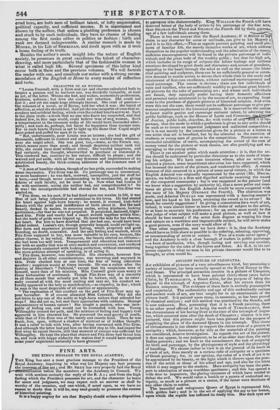FINE ARTS.
THE RING'S MESSAGE TO THE ROYAL ACADEMY..
THE King has sent a most gracious message to the President of the Royal Academy, inquiring in what way his Majesty can best promote the intereszAfize art,- and Mr. SHEE has very properly laid the Royal mutation before the members of the Academy in Council. Nire wait with anxious curiosity the reply of the R. A.s ; and from the high feeling which the President possesses for art, and the character he bears for sense and judgment, we may expect such an answer as shall be worthy of the occasion, and one which, if acted upon, as we have no reason to doubt that it will be, may tend greatly to promote the success of historical painting. It is a happy augury for art that Royalty should evince a disposition
II
to patrenize Who disinterestedly. Ring WILLIAM the Fourth will have deserved better of the body of artists by his patronage of the fine arts, than GEORGE the Third and GEORGE the Fourth did by theie_Eatroa. age of a few individuals among-them. There is but one answer that the Royal Academy, if it sires to a claim to any character for sense or rectitude, can give to his Majesty ; and it is to this effect,—That as regards portrait painting and small pie. tures of familiar life, the merely imitative works 'a art, which address!1 themselves to the popular understanding and the admiration of the manyi'l sufficient encouragement will be found in the private patronage of indit viduals and the great body of the wealthy public ; but that for high art; which includes in its range of subjects the loftier feelings and sublime emotions developed by great deeds and characters and.scenes of grandeur, appealing to the heart through the mind as well as the senses—for histo- rical painting and sculpture, there can be no sufficiently general or exten- ' sive demand to enable artists to devote their whole time to the study and attainment of first-rate excellence, without national encouragement and royal patronage. The reason is obvious ; there are few individuals of taste and intellect, who are sufficiently wealthy to purchase great histori- cal pictures for the sake of patronizing art : and where such individuals are found, they naturally prefer having their domestic affections and personal tastes ministered to by the means of art, to expending large sums in the purchase of gigantic pictures of historical subjects.. And even were this not the case, there would not be sufficient patronage to give per- manent employment to the historical painter. It is reserved for the nation to foster native genius and encourage eminent talent, by adorning the public buildings, such as the Houses of Lords and Commons of Justice, public halls, churches, &c. with works of arts i it is I portant, that the mode in which a preference is given to any artist should be such as to insure an impartial judgment and unlimited competition ; for it is not merely by the commission given for a picture or a statue to one artist that art is benefited, but by the stimulus to the exertion of students or young men of genius in the competition. Premiums to un- successful candidates of merit, accompanying the award of the sum of money voted for the picture or work chosen, are also gratifying and en. couraging to the young artist. There is yet another point which needs attention : it is, that the ar- tist should be unfettered by particular directions as to the mode of treat- ing his subject. We have seen instances where, after an artist has painted a picture, some impertinent alteration has been suggested, which has lessened the merit of the picture, and weakened its effect. A recent instance of this occurred in a picture of some naval victory, in which the English Admiral was originally represented by the artist (Mr. DRUM. MOND, we believe) in a firm and dignified attitude receiving the sword of the conquered commander ; but it was suggested to the painter (and we know what a suggestion by authority is), that a more polite and cour- teous air given to the English Admiral would be more congenial with the taste of his Majesty (GEORGE the Fourth). The alteration was made, and Admiral DUNCAN was represented with a dancing-master's bow, and his hand to his heart, returning the sword to its owner ! So ninth for courtly suggeitions In 'giving a commission fora work of art, indeed, it were almost better to leave the choice of subject to the artist, or at least to entertain his preference; for an artist must surely be the best judge of what subject will make a good picture, as well as how it should be best treated : if the artist feels disgust at wasting his time and talents on a worthless and impracticable subject, he will never make a good picture, even if the story would allow of it.
One other suggestion, and we have done : it is, that the Academy should have as little share as possible in the ordering, selecting, approving, or recommending of artist or subject. " Two of a trade never agree ; and the Academy is only a close borough of traders in public patronage —a knot of mechanics, who, though hating and envying one another, hang together for the sake of the loaves and fishes. An R.A. in his cor- porate capacity is what no man in his private character would like to be thought, or even would be.


























 Previous page
Previous page